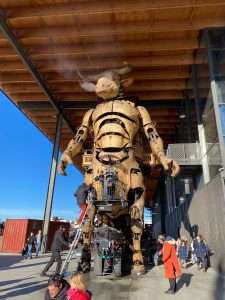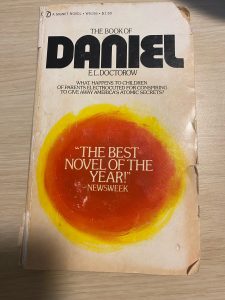On New Years Day I was visiting Toulouse, France with my dad and we went to a museum hosting the work of the group La Machine, a “street theater” group that creates large-scale machinery for performance. The group’s creations remind me a lot of the steampunk genre of sci-fi we talked about briefly in class, which features retro steam-powered machines over more modern, electronic ones.
Their website has tons of information about and images of their works: a giant spider which was part of a performance through the streets of Toulouse, their newest design “Heron Tree” and many more. I’m fascinated by how the group incorporates the steampunk aesthetic into so many different aspects of performance (giant animals, natural objects and musical instruments to name a few). The site describes the animals as performers which “feed an unusual vision of theatre, reading movement as a language, and in turn a source of emotion. The operators, engines, animals and musicians intermingle, confront and tune in with each other, thus creating images that change our relationship with the city, suddenly transformed.”

They have so many projects it’s impossible to capture them all in one post. On my visit to the museum, I was lucky enough to ride on this giant centaur they had created out of wood and machinery. It was extremely detailed (you can see the steam coming from its nostrils, the chest moved up and down as it “breathed” etc.) and it moved around the property, operated by two individuals who used VR and motion sensors so the machine would mimic their movement.
There’s so many other intriguing parts of the museum and I highly suggest checking out the site for a bit (especially their musical performances). I thought this group and their work really connects to this class and expands the steampunk genre into the theater/performance realm. We haven’t seen many live performance pieces (other than Defekt, of course) so I thought I would share their super unique work!

